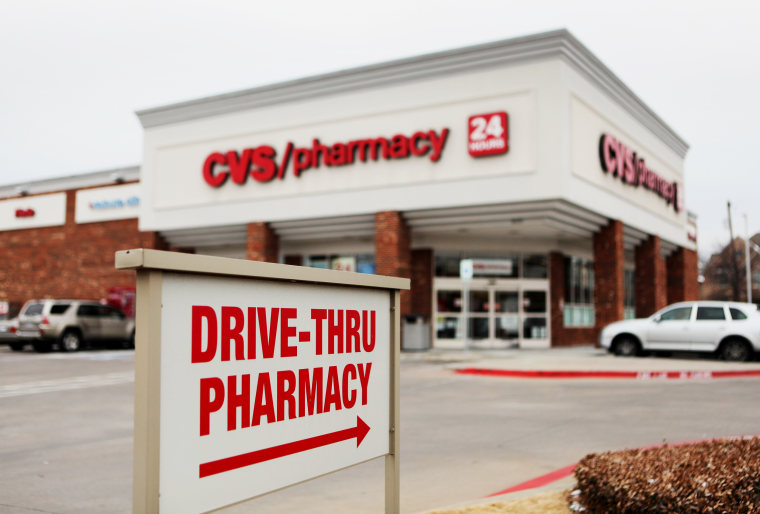Americans could benefit from the planned merger of the health insurance provider Aetna and CVS, but some health care analysts caution that one unintended consequence could be a race toward greater consolidation in the industry, which could have as-yet-unknown impacts on access and cost of care.
“I think there are savings to be had. The question may be how much of those savings are passed on to the purchasers of health care — either the consumers or the employers on their behalf,” Gail Wilensky, a senior fellow at the health care and education organization Project Hope, told NBC News.
By focusing more on the delivery of health care services, CVS can make up for ground lost on nonpharmacy sales to Amazon, Ana Gupte, a senior health care analyst for Leerink Partners, said via email. The deal, she said, “has a vision of repurposing their real estate within stores toward creating a low-cost clinic model.”
Using its significant retail footprint to deliver health care services also would give CVS a potent weapon in the fight against Amazon’s encroachment into the pharmacy space, as the e-commerce behemoth has been reported to be considering.
“Whether Amazon is going to enter the pharmacy business — it’s not a question of whether, but when,” said Craig Johnson, president of Customer Growth Partners.
Related: In CVS merger, is bigger better for you?
To create a bulwark against the pricing pressure a competitor like Amazon would no doubt bring, Johnson said CVS could position its retail footprint of some 10,000 stores to function not only as clinic sites, but even as dispatch hubs for distributing in-home care like infusions or management of chronic conditions for nonambulatory patients. “To the extent CVS can get a leg up from the point of view of cementing relationships with customers … this is a competitive advantage,” he said.
CVS’s shift from a drugstore chain to health care provider is years in the making, Boston College health economist Sam Richardson pointed out, foreshadowed in the company’s earlier purchases of Caremark and Omnicare, and its 2014 decision to stop selling tobacco products.
An industry ripe for change?
“We’re in an environment where health care in general is undergoing a massive amount of transformation … and you’ve got nontraditional players like Amazon looking at the health care space,” said Jim Winkler, a senior vice president in Aon’s health practice. “You could see a scenario where they dramatically change how we access care, how we pay for care, how we focus on access, cost and quality.”
But just what that change would look like — and what it would mean for Americans with anything from a cough to cancer — isn’t immediately clear.
“In the short run, I think this is likely good for consumers. I think it creates more coordination across the different health insurance systems,” Richardson said. “The question is, what does this do to competition further on?”
Gupte predicted that the merger could prompt CVS rivals to consider similar deals of their own. “Walgreens is likely to consider its own strategy to respond to the CVS deal and could involve purchase of a managed-care company such as [Humana] or [WellCare] or a PBM such as [Express Scripts],” she said.
While high prescription drug costs have been a concern of policymakers and patient advocates for some time now, it’s not clear that even a beefed-up CVS would be able to tame the worst of the cost inflation. A merged CVS-Aetna might have enough clout to drive down prescription prices overall, but lowering prices on high-priced specialty drugs might remain an elusive goal, Winkler said. “We’re still trying to figure out as an industry, how do we fund those?”
Better access to patient care
Where the CVS-Aetna merger could lower costs is in streamlining communications between patients, doctors and providers, Winkler said. An integrated platform could make it easier for patients to get preventative and follow-up care that could prevent costly hospitalizations. “If they’re successful at changing the way people are able to access primary and preventative care, in particular, that can lead to a better consumer experience in terms of cost and quality,” he said.
But if the CVS-Aetna merger creates a domino effect of health care companies buying each other, which some analysts consider likely, the impact on consumers could be both more wide-ranging and harder to predict in advance.
“It will be interesting to see if this sets off a chain reaction of mergers,” Richardson said. “Are we going to see other health care companies trying to merge? If this sets off a wave of consolidation, it’s not clear what that's going to do to consumers.” he said. “Overall, this type of vertical integration is probably good for the health care system, but we’ve got to keep our eyes open.”
